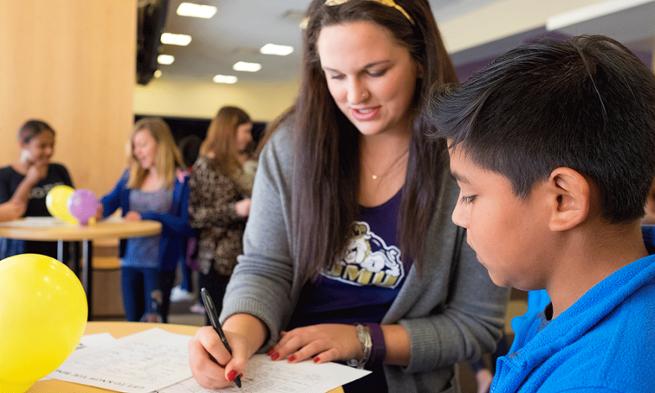If you could change one thing
JMU in the Community
SUMMARY: People say they want a better future, but few are ready to advocate for change. In an innovative exercise on active citizenship, JMU's Valley Scholars were immersed in a Shark Tank-style simulation in civic engagement.
By Diego Catala (’16)
From February 2016 digital Madison.
On Oct. 16, 2015, a group of Valley Scholars was immersed in a Shark Tank-style simulation that challenged them to promote, not a product, but a cause—“If you could change one thing about your school, what would it be?” While candidates on the highly rated TV show pitch their products to potential investors, the students championed their causes to a panel of judges.
Encouraging entrepreneurial thinking—the desire to solve problems and effect positive change—is a fundamental element of the Valley Scholars Program.
The concept for the event was born in an Organizational Communication class, in which a group of SCOM students selected the Valley Scholars program as their service-learning project. Mike Davis, communication studies professor and director of JMU Debate, enlisted members of the debate team to help the Valley Scholars prepare their presentations. The judges panel included Christine Johnson (’90), JMU Foundation Board member; Larry Kroggel, human resources director at Daikin Applied; Cannie Campbell (’95), director of corporate and foundation giving; Community Affairs Manager Rob Tucker; and Duke Dog, whose special appearance helped lighten the tension and elevate the mood.
Organized into four groups, the students could target any aspect of their school as long as they presented clear facts and reasoning as to why, and how, the feature could be improved. The debate team’s acumen in civic engagement as well as researching and advocating public policy decisions was readily apparent. They set up stations to help the young scholars prepare for their advocacy by writing down ideas and facts, conducting research, preparing posters as visual aids and structuring their presentations.
Each group of Valley Scholars accepted the challenge of civic engagement head-on: one group advocated for changing their school’s dress code, which they felt was unfairly applied to female students; two groups championed the need for change to school lunch programs in favor of more and healthier choices; and the final group presented the need to alter school sports programs to reflect changing demographics. The judges challenged each group with questions, allowing the students to defend their positions.
After lengthy deliberation, the judges named the all-female group advocating for changes to dress code policies as the challenge winner, citing their exceptional use of statistics, testimonials and even a U.S. Supreme Court case.
Of course, all the Valley Scholar participants walked away as winners. They received a free JMU Debate shirt and other goodies, but more importantly the students learned to ask, and answer, important questions: What needs to change? How should it change? What information do I need to gather to influence policy makers? How can I develop persuasive tools for my argument?
They received a foundational experience in civic engagement, and that makes our society as a whole the real winner.
